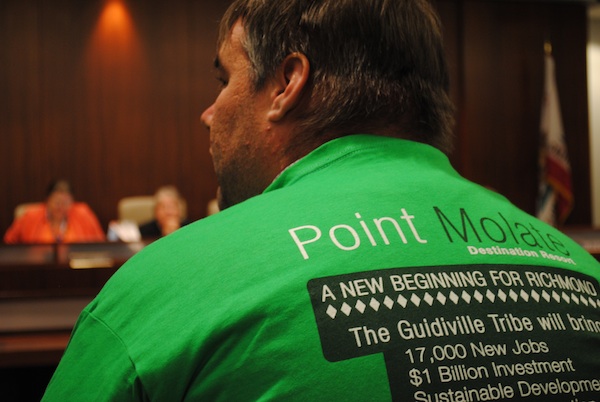At the Richmond City Council meeting this past Tuesday, most of the Latino residents in attendance were wearing green T-shirts supporting the controversial building of a casino in Point Molate in the hope that it might create new construction jobs. The casino project is supported by Union Labor Local 324, and the construction workers who belong to the union are almost all Latino and African-American.
“The casino is going to bring jobs to Richmond,” said Ruben Salazar, a 55-year-old laborer and resident of North Richmond who has been unemployed for a year. Salazar is a member of Union Labor Local 324 and so are the friends who sat next to him during the council meeting.
Laborers who are facing unemployment, like Salazar, see the casino project as hope for future construction jobs. They support the creation of jobs more than the idea of the casino itself. “We go to council meetings because we need a job,” said Antonio Sanchez, another union member who is facing unemployment.
Salazar and Sanchez said that they learned about the council meeting through word of mouth. Both got their T-shirts from the supporters of the casino who had a table outside of the Community Services Building where council meetings take place. Nearby, a group opposing the casino project had a table too; both groups were giving away sandwiches, pamphlets, signs and sodas. “Why oppose it if it’s going to bring jobs?” asked Salazar, referring to the group that is against the project.
Salazar and his wife, the parents of four children, are not working. The unemployment insurance money that Salazar gets is their only income. “If people don’t have the means to make ends meet, they are going to find other ways,” said Salazar, he fears that the crime rate will climb if unemployment in Richmond continues to rise.
But not all Latinos at the meeting supported the casino idea. One of the few Latinos that spoke up against the casino project was Andrés Soto, a member of the Richmond Progressive Alliance, a non-partisan liberal group. Soto is a 54-year-old musician employed part time. “Not all jobs are good jobs,” he said.
Soto alleged that developer Jim Levine of Upstream, which has partnered with the Guidiville Band of Pomo Indians to turn what used to be the Point Molate Naval Fuel Depot into a casino-hotel resort, had organized the leaders of the labor unions in order to get people of color show their support for the project.

The T-shirts given away by Upstream promised “17,000 new jobs.” But Soto contested those figures. “The number of jobs has been inflated,” Soto said. He also said that Latinos, who have been hit hard by the recession, are vulnerable to believing a sugar-coated story that promises jobs.
Salazar and other members of his union were a strong presence at the beginning of the council meeting, which started off with a full house. Some attendees were standing unable to find chairs to sit down. But the number of attendees faded away as the meeting stretched past midnight.
At 10:00 pm the council started discussing the city’s right to explore various development alternatives for the Point Molate site. Mayor Gayle McLaughlin read part of a 2006 settlement agreement that stated that the city had the right to look at other projects. But by this point, more than half of the attendees had left.
Salazar, who left a few hours into the meeting, was unaware of the possibility of other projects. When later asked if he would support a different plan, he said, “If it brings jobs and we are all content, I would support other projects.”
May 20, 2010 Richmond Confidential

